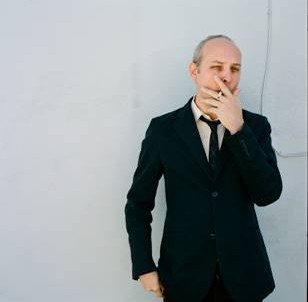Brian McBride

Brian McBride en su carrera en solitario y miembro de Stars Of The Lid nos ofrece después de su disco “When the Detail Lost Its Freedom” [2005, Kranky], su segundo álbum “The Effective Disconnect” [Kranky, 2010], un disco romántico que mezcla piezas clásicas modernas de piano y vientos y bellas atmósferas en el marco de un austero y conmovedor ambient.
“The Effective Disconnect” es una composición para el documental “Vanishing of the Bees” (“La Desaparición de las Abejas”) que consta de 11 temas para los cuales no utilizó grabaciones ya realizadas, así como tampoco la arquitectura de composición de registros anteriores, sino que privilegió las piezas pequeñas.
“The Effective…” muestra la alegría y la belleza de las abejas pero también la tristeza sobre un tema que daña el ecosistema; el colapso de las colonias y sus efectos en los apicultores y en la provisión de alimentos en Norte América.
www.kranky.net
Brian McBride as a solo artist and also member of Stars Of The Lid delivers after “When the Detail Lost Its Freedom” [2005, Kranky], his second album “The Effective Disconnect” [Kranky, 2010], a romantic record that combines modern classical pieces of piano and strings, and beautiful atmospheres in an austere but disturbing ambient.
“The Effective Disconnect” is a composition for the documentary “Vanishing of the Bees” that consist in 11 pieces to which were not used previous recordings and his architecture compositions as well, but mini-suites.
“The Effective…” show up happiness but also sadness about a theme that damages the ecosystem; the colony Collapse Disorder and its effects on beekeepers and on North America’s food supply.
www.kranky.net
¿Nos podrías explicar la motivación que tuviste por el tema y composición para el documental “Vanishing of the Bees”?
“No estaba en ningún caso en una carrera por salvar a las abejas. Pero el año anterior al haber sido abordado para escribir para este documental, el tópico que estaba en debate fue la reducción de subsidios a la agricultura, por lo que investigue mucho en las preguntas para una agricultura sostenible versus una agricultura industrial. Siempre he creído y he sido un consumidor de comida orgánica. He intentado ser consecuente con lo que pienso del mundo pero no porque sea un protector de las futuras generaciones. El medio ambiente no es algo que debería protegerse porque nuestros hijos necesitarán comida y algunos árboles para visitar. Algunas cosas tienen valor en sí mismas”.
¿En qué otras formas de arte has compuesto o vas a componer en el futuro cercano?
“Este es el primer filme para el que he trabajado con dedicación exclusiva. Tengo muchas piezas de música que se han usado en películas, pero es la primera vez que he colaborado con cineastas para desarrollar música, mientras estaban en la etapa de edición”.
Siento que las principales emociones que están en “The Effective Disconnect” son la tristeza y la alegría. ¿Están conectadas estas emociones con el tema del documental y por qué?
“Mientras escribía y grababa intenté adherir a dos principios principales: sabía que quería que la música transmitiera una sensación de fragilidad dado el tema en cuestión. Y también a propósito traté de no recargar el filme, de tal manera que les entregara a ellos algo para que enfatizaran sus ideas, antes de crear un tipo de música para video. George y Maryam me pidieron que me concentrara en cuatro temas diferentes. En algunos temas estuve mejor que en otros. En la ‘gloria de las abejas’ fue un tema difícil para mí. Comunicar belleza no puede salir forzado. No quieres que salga meramente para ornamentar o trillado. Pero la principal preocupación estuvo en la música para que sirva como un recuerdo y muestre lo frágil que es el ecosistema. Todos necesitamos que de vez en cuando nos hagan recordar la fragilidad de este mundo”.
¿En qué otros temas estás interesado para futuras composiciones?
“No pienso en temas por adelantado. Depende del proyecto y si creo o no que mi música encaja bien para el tipo de comunicación o tema en cuestión”.
Guillermo Escudero
Noviembre 2010
Could you please explain the motivation you had for the issue and composition for the Documentary “Vanishing of the Bees”?
«I wasn’t attending any save-the-bees rallies or anything. But the year before I was approached to write music for the film, the college debate topic was about reducing agricultural subsidies so I did an immense amount of research on the questions of sustainable agriculture versus industrial agriculture.
I always been a consumer and believer in local and organic food. I try to be conscious of my influence on the world but not because I believe in protecting future generations. The environment isn’t something that should be preserved because our kids will need some food or some trees to visit. Some things have value in themselves.»
In what other art forms you have composed or are you going to compose in the near future?
This is first film that I’ve worked on prior to film lock. I’ve had many pieces of music used in films but this is first time I’ve collaborated with filmmakers to develop music while they were still in the editing stage.»
I feel that the main emotions involved on «The Effective Disconnect» are sadness and happiness. Are these emotions connected with the issue of the documentary and why?
«While writing and recording, I tried to adhere to two guiding principles: I knew that I wanted the music to convey a sense of fragility due to the subject matter. And I also purposely tried to not overwhelm the film, wanting to provide them something that emphasized their ideas more so than creating some type of music video. George and Maryam asked me to concentrate on four different themes. Some themes I was better at than others. The ‘gloriousness of the bees’ was a tough one for me. Communicating beauty can’t really be forced. You don’t want it to become merely ornamental or trite. But the main concern was for the music to serve as a reminder as to how fragile this ecosystem is. We all need reminders how fragile the world is around us from time to time.»
In which other issues you are interested in for future compositions?
«I don’t really think of issues in advance. It depends on the project and whether or not I believe my music is good fit for the type of communication and subject matter.»
Guillermo Escudero
November 2010

